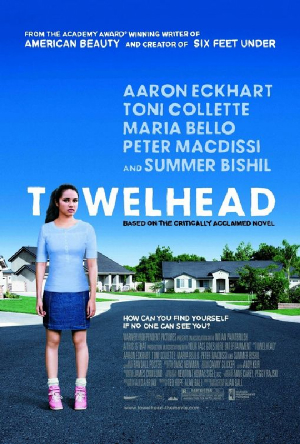 I remember being first intrigued by this film by the title, more than anything else. Though I didn’t know then what the meaning of towelhead actually is, I hazarded a very good guess (which turned out to be true: derogatory way to speak of Muslims/Arabs). I wasn’t particularly offended; if anything, the thought more than just amused me a little. It was also promoted by Aaron Ekhart on ‘The Daily Show’, at a time when ‘The Dark Knight’ was still being shown at most theaters across the country. “Busy man,” I had thought to myself, as he playfully joked around with the host, Jon Stewart.
I remember being first intrigued by this film by the title, more than anything else. Though I didn’t know then what the meaning of towelhead actually is, I hazarded a very good guess (which turned out to be true: derogatory way to speak of Muslims/Arabs). I wasn’t particularly offended; if anything, the thought more than just amused me a little. It was also promoted by Aaron Ekhart on ‘The Daily Show’, at a time when ‘The Dark Knight’ was still being shown at most theaters across the country. “Busy man,” I had thought to myself, as he playfully joked around with the host, Jon Stewart.
But really, it was the premise of the exploration of the Muslim perception in America that truly intrigued me. I had thought that the film intended to look at the negative experience that one might face as a Muslim in America. Such subject matters, for obvious reasons, have always interested me, and so I kept more than just an eye out for it.
What a disappointment, then, when I realised that the film is more a sexual coming-of-age story than a “go back to your country, you f*cking Paki!”-type narrative.
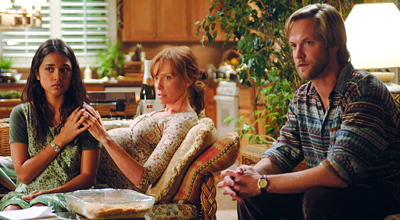
We follow a young Lebanese-American girl named Jasira (Summer Bishil), who, at the start of the film, is living with her mother, Gail (Maria Bello). However, it is not her we see at the start of the film, but her mother’s boyfriend who is telling Jasira not to worry as he prepares to shave her pubic hair. “You’re so beautiful, Jasira,” he said, before continuing more ominously, “Only…probably you shouldn’t tell your mom about this.”
Feel a little something in your stomach yet? That’s what this movie is like, almost from start to finish. No, he didn’t rape her or have sex with her (at least, it wasn’t shown within that opening scene), but her mother was angry enough to send her to her father, Rifat (Peter Macdissi). He’s a Lebanese-American too, but perhaps emphasis should be placed more on the American part of the equation; he works with NASA as an engineer, and is proud, bordering on arrogant, of his American roots. In fact, he sees himself as so American that he is constantly trying to outdo his neighbour, Army reservist Travis Vuoso (Aaron Eckhart), in showing how American he is. He even tried to outdo him by erecting an American flag in his yard, in support of the Gulf War (the first one).
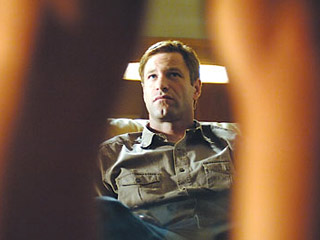
Unfortunately, things grew to a head (what kind of head? Ho hum. 🙂 ) before long. Travis, along with Jasira’s classmate, Thomas (Eugene Jones), both display a sexual interest in Jasira. It doesn’t help that Jasira is spending more and more time over at Travis’s house, being the babysitter to his son, Zack (Chase Ellison). Then again, Jasira doesn’t really do much in terms of toning things down a bit. She didn’t hide her interest in Travis’s Playboy magazines (which Travis gives to her, and helped to further encourage her sexual awakening), and she doesn’t really know the limits of how to behave and dress (or not) in front of adults. “There are right ways to act around men, and wrong ways,” said her mom early in the film, as she is sending her off at the airport to live with her father. “And for you to know which is which, you should go live with one.”
And that, in a way, reflects almost the entire ethos of the movie: use and abuse. Jasira, then, becomes the vessel, the mode for the message. She becomes used by those around her, including both her parents. No one truly understands or even attempts to understand her feelings or her state of mind (with the exception of her neighbour, Melina [Toni Collete]). In fact, she is the one who portrayed the most motherly and understanding of influences on Jasira’s life.
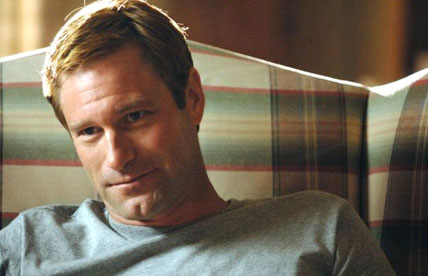
There’s a fantastic bit of dialogue between Melina and Jasira that highlights this friendly and motherly relationship. “Do women ever look at them and feel good?” asked Jasira, referring to the pictures of naked women in a men’s magazine. “Well, maybe. They’re sexy pictures. How anyone feels about them is private. But how a kid your age got a magazine like this, that isn’t private.” Very few people, then, provide her with a good role model to follow (in that regard, the movie could be said to be very realistic…).
I suppose we could say that his father also tried to be a father in parts, but I’d argue strongly that he is more interested in using her as a form of trophy, to show what a good, upstanding, American father he is. The Gulf War provides an opportunity for him to do the ‘American’ part, wishing for Saddam’s death every time the news came on the TV. Jasira won’t find much solace in her mother’s arms either, who probably sees her more as a pawn in the game between her and Rifat.
The theme continues with Travis and Thomas. Travis, finding himself becoming more and more attracted to her, begins to spend more and more time with her, and even becoming involved in compromising positions. Thomas takes it to the next level, practically throwing himself at her at almost the first opportunity. Both are using her as a way to reassert their manhood, perhaps. In Thomas’s case, that is something that he is just getting started with: “I feel like a man now.”
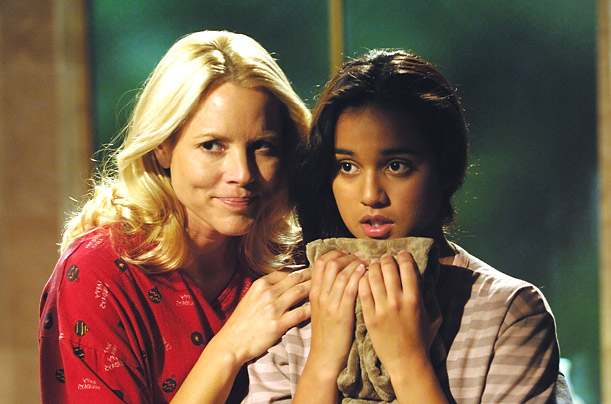
Though I suppose it is normal for the main characters to be the main vessels, even the director, Alan Ball, shouldn’t be exempt from being accused of using Jasira in such a way. To be more exact, the title of the film is changed, almost without reason, from its original film title. There are, of course, racial undertones, but it is never, at any point of the film, something that becomes truly important that it supercedes the sexual journey that Jasira is on. It’s like changing the name of ‘Sell Out!’ to ‘The Two Bickering Old Men’; the element is there, but it never really takes center stage. Admittedly, the original name of the film, ‘Nothing is Private’, doesn’t sound particularly inspiring (the original novel is called ‘Towelhead’). Nevertheless, I urge you not to have such expectations before watching this movie. I did, and in that regard, I was disappointed.
That’s not to say that it’s terrible; far from it. In fact, it is a very good film, one that deserves to be seen, if only for the thoughts that it might provoke in your head (is this really what we’re teaching our kids?). There are good all-round performances here, with Summer Bishil being a nice little revelation. The film’s also very well-shot: little of the handheld, shaky, out-of-focus types. What you have is something that’s very clean, very neat, and very pleasant to watch.
The only question is whether you’re willing to sit through a film in which a 13 year-old girl gets fingered by the guy who played Harvey Dent.
Without feeling a little sick in your stomach.
Fikri is glad that Summer Bishil is actually not a teenager.

The novel’s name is actually Towelhead, written by Alicia Erain. Quite good and gives you a bit more understanding of what Jasira is thinking, since it is written in her voice.
Damn. 😦 Duly noted, and modified.
I went looking for it, actually, but couldn’t find it. Was tempted by The Kite Runner, though…
Great Review.
I was a bit surprised too when I found out the racial issue is just in the background, rather than the main element. However, when I remember that Allan Ball has touched the subject of teenagers-sexual awakening-role of adults in “American Beauty”, I am glad that his more recent work has somehow evolved into looking at the subject from a more global perspective.
True that. 🙂 Thanks for dropping by.